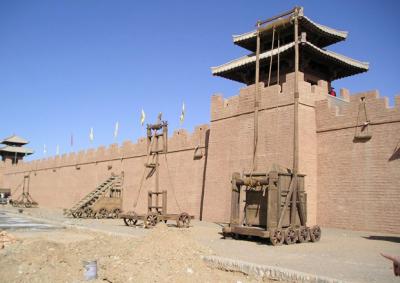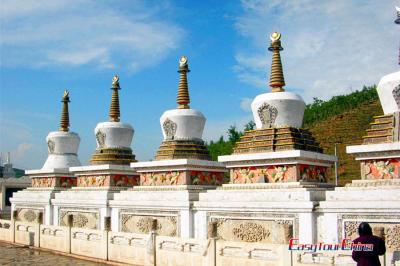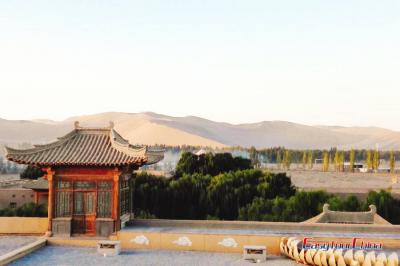Yang Pass
Yang Pass, together with another grand pass - Yumen Pass acted as two important western passageways of Great Wall to Central Asia, India and Europe in Western Han Dynasty (206BC - 24AD). It was ordered to be built by Emperor Wu in purpose of consolidating the frontier defense as well as developing the remote western region. Yang means south in Chinese and Yang Pass got its name for its location to the south of Yumen Pass. The two significant passes witnessed the prosperity of the ancient Silk Road as its important forts. The famous Chinese Buddhist monk, scholar, traveler, and translator Xuan Zang set foot there on his return to Chang'An (Xian) from India. During its prosperous period as a military stronghold, Yang Pass was rich in water and was an oasis.
 Quite a lot Chinese come to know Yang Pass mainly from the famous line written by Wang Wei, a renowned poet in Tang Dynasty, "Oh, my friend, I sincerely entreat you to have another cup of wine; you will see no more friends west out of the Yangguan Pass". This poem reflects that the Yanguan Pass has always been the place of desolation and sadness since ancient times. Today, Yangguan is in ruins buried under sand dunes, thus there are hardly any walls in sight; the only visible sections are the foundations of some of the walls. Millions pieces of broken tile piling in the south of Yang Pass is the last evidence of civilization once existed here. However, the Yangguan Pass museum nearby offers a glimpse of the lost civilization through exhibits of sculptures, frescos and historical relics. A ruined tower standing on a reddish sandstone hill gives a perfect view of the vast area around Yang Pass.
Quite a lot Chinese come to know Yang Pass mainly from the famous line written by Wang Wei, a renowned poet in Tang Dynasty, "Oh, my friend, I sincerely entreat you to have another cup of wine; you will see no more friends west out of the Yangguan Pass". This poem reflects that the Yanguan Pass has always been the place of desolation and sadness since ancient times. Today, Yangguan is in ruins buried under sand dunes, thus there are hardly any walls in sight; the only visible sections are the foundations of some of the walls. Millions pieces of broken tile piling in the south of Yang Pass is the last evidence of civilization once existed here. However, the Yangguan Pass museum nearby offers a glimpse of the lost civilization through exhibits of sculptures, frescos and historical relics. A ruined tower standing on a reddish sandstone hill gives a perfect view of the vast area around Yang Pass.
 Quite a lot Chinese come to know Yang Pass mainly from the famous line written by Wang Wei, a renowned poet in Tang Dynasty, "Oh, my friend, I sincerely entreat you to have another cup of wine; you will see no more friends west out of the Yangguan Pass". This poem reflects that the Yanguan Pass has always been the place of desolation and sadness since ancient times. Today, Yangguan is in ruins buried under sand dunes, thus there are hardly any walls in sight; the only visible sections are the foundations of some of the walls. Millions pieces of broken tile piling in the south of Yang Pass is the last evidence of civilization once existed here. However, the Yangguan Pass museum nearby offers a glimpse of the lost civilization through exhibits of sculptures, frescos and historical relics. A ruined tower standing on a reddish sandstone hill gives a perfect view of the vast area around Yang Pass.
Quite a lot Chinese come to know Yang Pass mainly from the famous line written by Wang Wei, a renowned poet in Tang Dynasty, "Oh, my friend, I sincerely entreat you to have another cup of wine; you will see no more friends west out of the Yangguan Pass". This poem reflects that the Yanguan Pass has always been the place of desolation and sadness since ancient times. Today, Yangguan is in ruins buried under sand dunes, thus there are hardly any walls in sight; the only visible sections are the foundations of some of the walls. Millions pieces of broken tile piling in the south of Yang Pass is the last evidence of civilization once existed here. However, the Yangguan Pass museum nearby offers a glimpse of the lost civilization through exhibits of sculptures, frescos and historical relics. A ruined tower standing on a reddish sandstone hill gives a perfect view of the vast area around Yang Pass.The trip to Yang Pass takes about 2 to 3 hours, you can take train in the railway station of the small town of Yumen, or hire a minibus.
More Attractions in Dunhuang


